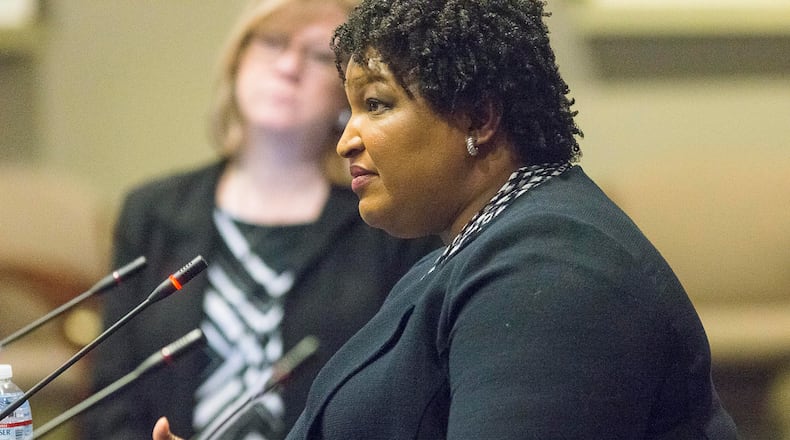Stacey Abrams and other voting rights activists brought their case for far-reaching changes to Georgia’s electoral system to a U.S. House panel on Tuesday to probe allegations of suppression and intimidation in last year’s vote.
The House Democrats heard criticism of the uneven standards for counting provisional and absentee ballots, the cancellations of thousands of voter registrations from Georgians who didn’t participate in recent elections, and lines that stretched for hours at some polling places.
“From issues with registration to ballot access to the counting of votes, Georgians faced a systemic breakdown of its electoral process,” said Abrams, the Democratic runner-up in last year’s race for governor who accused Brian Kemp of unfairly using his position as Georgia’s top elections official to win the contest.
Georgia, she added, suffers from a voting system where “incompetence and malfeasance operate in tandem” to mask voter suppression through lax state oversight, outdated equipment and disproportionate enforcement of registration laws.
Kemp has vehemently denied accusations that he abused his office’s power and said he merely followed state laws designed to ensure that only eligible Georgia voters can cast ballots.
He and other Republican officials were not asked to testify at the Carter Center hearing, but have generally contended that Abrams and other Democrats want to loosen elections rules meant to block illegal voting.
“Stacey can’t get over the fact that she lost. Voter fraud does exist in this country, and to say that it doesn’t is not truthful,” said U.S. Rep. Doug Collins, R-Gainesville. “She’s still re-litigating the election from November in preparation for an election coming up.”
House Democrats want to use the testimony at the hearing to lay the legislative groundwork to bolster the Voting Rights Act, a 1965 law that was weakened six years ago by a U.S. Supreme Court ruling.
That decision directed Congress to build a "robust" legislative record before bringing back the Justice Department's mandate to pre-clear certain voting changes in Georgia and other places with histories of voter suppression.
Credit: Alyssa Pointer
Credit: Alyssa Pointer
The half-dozen Democratic House members — no Republican lawmakers were at the event — heard from the Georgia chapter of the American Civil Liberties Union and other groups who assailed the lack of a clear protocol for signature matches that resulted in a disproportionate number of absentee ballots being rejected last year.
And they listened to testimony from Stacey Hopkins, a Fulton County resident who decried the “postcard trick” that could have resulted in her name being removed from the rolls after she received a letter informing her she needed to confirm her voting address after moving in May 2016.
“I can’t really explain all the ranges of emotions I felt when I saw this notice,” she said, describing it as a trick because it looks innocuous. “It’s an abbreviated feeling of the stages of grief — except the one thing I couldn’t do is accept it.”
A Republican-backed measure that could authorize the $150 million purchase of touchscreen voting machines that print ballots — rather than require voters to fill them out by hand — was a frequent subject of discussion during the meeting.
Credit: Alyssa Pointer
Credit: Alyssa Pointer
Abrams, for one, said the new machines have the same problems as the 17-year-old system that Georgia now uses, including a lack of an “auditable trail” that breeds more distrust of the election system.
“When you have no faith in the system, you have no reason to participate in the system,” she said. “And that chilling effect should concern us all.”
The event was the second in a string of hearings across the nation, and Democrats say they’ll use the findings to help build their case for more federal oversight of elections.
“We want to make sure that by the time we’re in 2020 we won’t still be dealing with the issues we’re dealing with today,” said U.S. Rep. Marcia Fudge, the chairwoman of the committee.
About the Author
Keep Reading
The Latest
Featured


![02/19/2019 -- Atlanta Georgia -- U.S. Rep. John Lewis[cq] (left), D-Georgia, and U.S. Rep. Hank Johnson[cq](right), D-Georgia, listen to speakers during a field hearing on voting rights and difficulties facing voters in front of the United States House Administration Committee's elections subcommittee, chaired by U.S. Rep. Marcia Fudge, D-Ohio, at the Jimmy Carter Presidential Center in Atlanta, Tuesday, February 19, 2019. (ALYSSA POINTER/ALYSSA.POINTER@AJC.COM)](https://www.ajc.com/resizer/v2/TQUNOEJAPGM4CPCTZ2JMUHEGHI.jpg?auth=8067d9acb7f0d5ce81a003e2c1e717d6ba22dc89647027b37f6368de96184164&width=600&smart=true)



